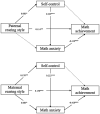Parents' rearing styles and adolescents' math achievement: the multiple mediating effect of self-control and math anxiety
- PMID: 39478802
- PMCID: PMC11522982
- DOI: 10.3389/fpsyg.2024.1413899
Parents' rearing styles and adolescents' math achievement: the multiple mediating effect of self-control and math anxiety
Abstract
Introduction: This cross-sectional study examined the mechanisms underlying adolescent math achievement by investigating the relationship between parents' rearing styles (including different dimensions of rearing style) and adolescent self-control, math anxiety, and math achievement based on the ecological systems theory.
Method: A total of 584 junior high school students (M age = 12.52) completed the Parenting Style Questionnaire, Self-control Scale, and Math Anxiety Rating Scale and provided their math test scores.
Results: The rearing styles of both fathers and mothers directly predicted adolescents' math achievement. Maternal rearing style indirectly predicted adolescents' math achievement through their self-control and math anxiety; however, the indirect effect of paternal rearing style on adolescents' math achievement was not significant. After distinguishing the three dimensions of rearing styles, we found that paternal emotional warmth can increase adolescents' self-control, while maternal emotional warmth can reduce adolescents' self-control. Further, paternal overprotectiveness can directly and positively predict adolescents' math achievement, while maternal rejection and overprotectiveness can positively predict adolescents' math achievement. None of the three dimensions of rearing styles can predict math achievement through adolescents' self-control; however, they can predict math achievement indirectly through adolescents' math anxiety and the chain-mediation of adolescents' self-control and math anxiety.
Discussion: Our results suggest both commonalities and differences in how paternal and maternal rearing styles, along with their three dimensions (emotional warmth, rejection, overprotection), predict adolescent math achievement. These findings highlight the importance of paternal and maternal rearing styles on adolescents' math achievement and underscore the need to examine them separately to better understand their impact.
Keywords: adolescent; math achievement; math anxiety; parents’ rearing styles; self-control.
Copyright © 2024 Wang, Han, Tao and Ma.
Conflict of interest statement
The authors declare that the research was conducted in the absence of any commercial or financial relationships that could be construed as a potential conflict of interest.
Figures
References
-
- Bandura A. (1997). Self-efficacy: The exercise of control. New York: Freeman.
-
- Bardach L., Yanagida T., Goetz T., Jach H., Pekrun R. (2023). Self-regulated and externally regulated learning in adolescence: developmental trajectories and relations with teacher behavior, parent behavior, and academic achievement. Dev. Psychol. 59, 1327–1345. doi: 10.1037/dev0001537 - DOI - PubMed
-
- Borgonovi F., Pokropek M., Pokropek A. (2023). Relations between academic boredom, academic achievement, ICT use, and teacher enthusiasm among adolescents. Comput. Educ. 200:104807. doi: 10.1016/j.compedu.2023.104807 - DOI
LinkOut - more resources
Full Text Sources


